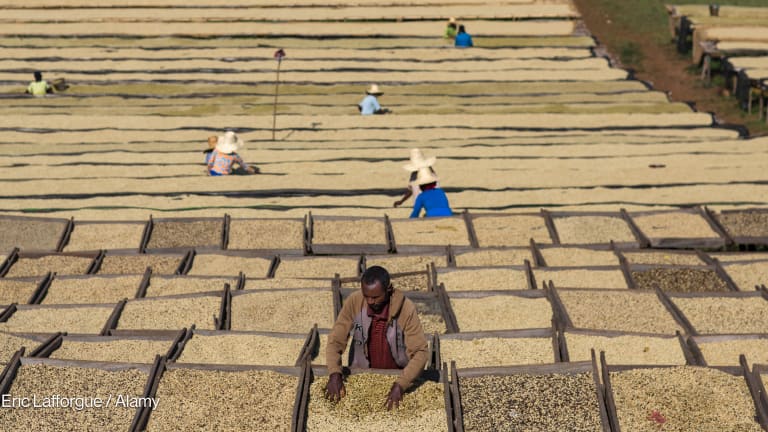
U.S. President Barack Obama’s pronouncements that Africa is poised to emerge from decades of foreign aid into a future of trade have elicited mixed responses from members of the development community, some of whom worry the continent’s poorest populations are not positioned yet to benefit from a surge in private investment.
Questions surround how exactly the administration will use limited funds to balance leveraging private sector partnerships with ensuring that sufficient foreign assistance resources continue to flow to programs that support Africa’s poorest populations.
That balancing act must ensure the necessary regulatory environment is in place in African trade and investment partner nations — prior to paving the way for private multinational firms to intensify agricultural production and natural resource extraction to accelerate economic growth on the continent.
That will demand a degree of targeted coordination between private investors, aid agencies and development implementers that, according to several industry experts, the administration has yet to fully articulate, despite campaigns like the New Alliance for Food Security and Nutrition, announced last year by G-8 leaders, and ”Power Africa,” a new initiative to spur energy development through public-private partnerships.
Relationship and trade: Hand in hand
Members of the development community stress they were in “conversation” with the Obama administration prior to his trip to Africa last week, emphasizing the importance of a “hand-in-hand” relationship between aid and trade to ensure inclusive, broad-based economic growth.
“We are going to be making sure the messages we want to get across are getting across, in terms of the poverty focus, ensuring that whatever paradigm shift there may be doesn’t leave anything on the sidelines,” said Jeremy Kadden, senior legislative manager at InterAction, a U.S.-based network of nongovernmental organizations.
Kadden told Devex: “We just want to make sure the benefits are broadly distributed and they get to the smallholders and those who need the most help in being a part of the system and not just those who are already benefiting from the system.”
Others see a trend toward a more “limited role” for donor-funded programs to support the continent’s transition from aid recipient to trade and investment partner, stressing the transition reflects Africans’ own calls for a new kind of relationship with the United States and other potential trade partners.
That limited role, according to supporters of a trade-led approach, would see official foreign assistance operating more as a catalyst to spur infrastructure and energy investments and to take steps to ensure those investments benefit from a favorable regulatory environment.
“Ultimately, for societies to develop they need power and infrastructure,” explained Dan Runde, director of the Project on Prosperity and Development at the Center for Strategic and International Studies.
Runde told Devex that “the more investments in energy you have, the price of energy drops.” He added that the African Development Bank “has a huge role to play here, and is an organization that has great credibility in Africa.”
US aid as catalyst for investment
During his trip, Obama stressed the role foreign aid can play as a catalyst for private sector investment. Case in point: the so-called Power Africa initiative, by which the U.S. government has pledged to direct $7 billion to sub-Saharan energy investments, brings together several U.S. agencies with partners including General Electric.
Runde, though, questioned whether the effectiveness of Power Africa will suffer from an overabundance of prescriptive development requirements and unwillingness to offer the type of unencumbered partnership that he says African nations are actually asking for, at a time when they are attracting more interest from a variety of investors and partners, especially China.
“I’m not sure the instruments that we have reflect what Africa needs today in 2013 as opposed to 2005,” he said, citing a controversial “carbon cap” that restricts carbon emissions for investments by the Overseas Private Investment Corp., a key partner in Power Africa.
Runde called for a waiver of the cap for low-income African countries.
“They’re not going to say, ‘since you won’t give us gas-powered generators, United States, well, then just give us solar panels and wind mills,’” he said. “We need to be vigilant about how Africa is changing and make adjustments to make sure our solutions match the evolving challenges.”
Renewed focus on Africa
Despite positive macroeconomic signals (seven of the 10 fastest-growing economies are in Africa), nascent investment fervor and concerns that China is beating the United States to the punch, many experts continue to question whether Africa has actually reached a “tipping point” of economic security and growth.
According to World Bank statistics, 2012 was the first year since 1981 that less than half of sub-Saharan Africa’s population lived in absolute poverty.
Obama’s vision of a trade partnership with Africa must make inroads into persistent corruption problems to overcome a “history of distrust” between the public sector and the private sector, Jonathan White, transatlantic fellow at the German Marshall Fund, told Devex.
Progress on this front will be required if the shift from aid to trade is to amount to more than economic growth for a well-positioned few, an outcome that would likely only fuel charges of neocolonialist resource extraction and land-grabbing.
Obama’s trip shined a “spotlight” on Africa, and offered a sense of renewed focus on the developing world, for which many development practitioners and world leaders appeared grateful.
For now, they remain hopeful that the spotlight will be big enough to ensure that aid and trade go hand in hand.
Join the Devex communityand gain access to more in-depth analysis, breaking news and business advice — and a host of other services — on international development, humanitarian aid and global health.








